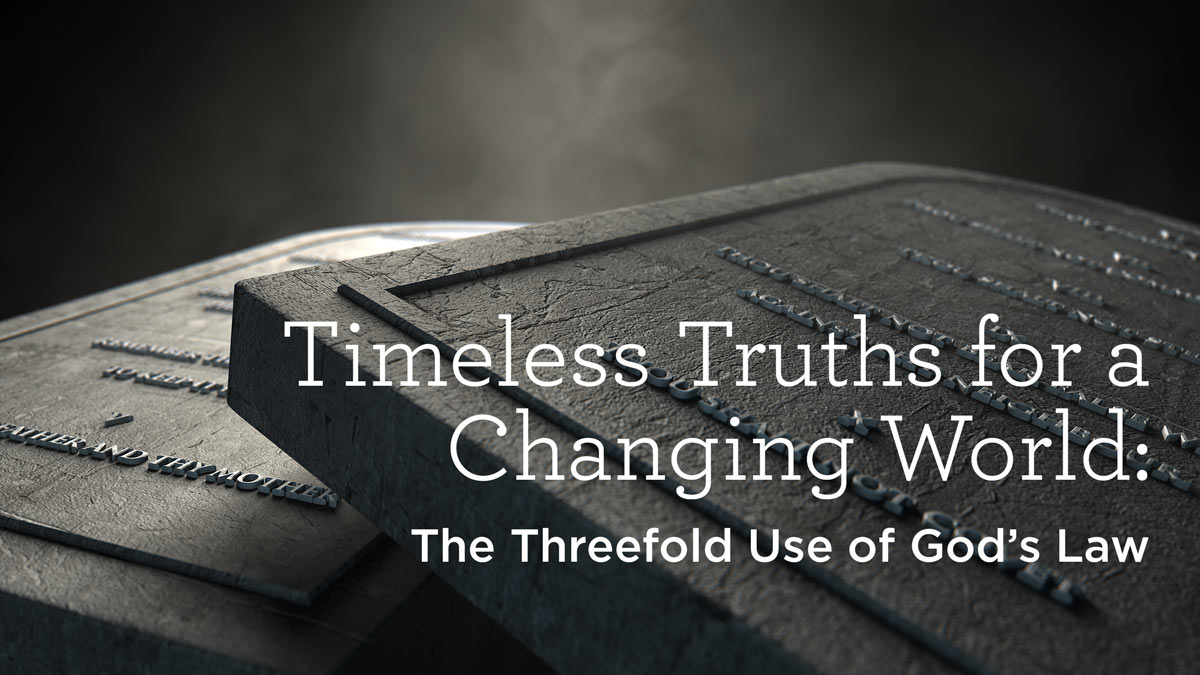
All of God’s Word is relevant for all of the Christian life. According to 2 Timothy 3:16, “All Scripture is breathed out by God and profitable for teaching, for reproof, for correction, and for training in righteousness” (emphasis added). And yes, “all Scripture” includes genealogies, censuses, and seemingly obscure ritual laws.
Oftentimes, however, it’s easy to be a little confused about how Old Testament law—even something as general as the Ten Commandments—applies to New Testament believers. Volume upon volume has been penned on the relationship of the Christian to Old Testament law, and this is not the place to rehash that complex discussion. However, many of the Reformers and theologians who have followed in that stream have articulated a threefold use of the law. Examining this threefold use will not answer all of our questions, but as we observe each use in turn, we will begin to grasp just how the law of God applies to our world and our lives today.
1. The Civil or Political Use
First, God’s law exists in the civil realm to restrain wrongdoing and to promote right living. The legal systems of both the United States and Great Britain begin with just such a conviction: that there really is a transcendent principle of right (natural law) to which all people—no exceptions—are subject.
Looking around at a post-9/11, post-Obergefell, post-pandemic philosophical and spiritual vacuum, however, it might be all too easy for us to miss the fact that the very substructure of Western law and morality has been built on biblical law. For example, take a watershed decision like Roe v. Wade, in which the Supreme Court of the United Sates overstepped its legitimate authority. Had it rendered a decision on the basis of God’s moral law, then the court would have been forced to recognize that the sixth commandment, which forbids murder, takes precedent over any rights a woman may have in the matters of sexual freedom and the jurisdiction of her body. Instead, the highest court in the land acquiesced to social utility and divorced itself from absolute divine norms.
As Christians, we are committed to God’s Word in its entirety. As Jesus has told us, “Until heaven and earth pass away, not an iota, not a dot, will pass from the Law until all is accomplished” (Matt. 5:18). But in our day and age, who wants to return to what they perceive as the so-called “enslavement” of biblical ethics? Biblical norms are old-fashioned, restrictive, and simply unfit for modern life, many would contend. As Donald Macleod writes, “People tend to imagine that the moment we move away from biblically controlled legislation we will get more freedom and more tolerance. That is not the lesson of history. What we will get is more inhumanity, more barbarism, and more savagery.”1
So, what are we Christians to do? Let’s begin by considering what we ought not do. Sometimes our witness to biblical truth can resemble an English speaker in a foreign land who believes that if he just speaks a little bit louder, those around him will finally understand. Enflamed rhetoric and shouting one another down has characterized too much of our moral dialogue and debate. Correcting our mistakes will demand humility and civility: learning to engage our neighbors in conversation by listening to their view of the world, probing their arguments, and gently pointing out the logical implications of their views.
God’s law provides the foundation and parameters for civil and political freedom. Here we find timeless wisdom that is to regulate daily discourse and which gives significance and purpose to life and work. And so, we should be unashamed in affirming the validity and necessity of God’s law. After all, the alternative—(perceived) unlimited personal freedom combined with runaway materialism—brings nothing better than insatiable hunger and dreadful loneliness.
2. The Pedagogical Function
Drawing on Paul’s language in Galatians 3:24, the Reformers also spoke about the pedagogical function of the law. The pedagogus in Roman culture was the slave who took the child to school. Likewise, with Christ as the Teacher, the law performs the function of leading the child to Him. Luther referred to this as “the principal purpose of the Law and its most valuable contribution.” His statement to this effect is so powerful that it is worth quoting in its entirety:
As long as a person is not a murderer, adulterer, thief, he would swear that he is righteous. How is God going to humble such a person except by Law? The Law is the hammer of death, the thunder of hell, and the lightning of God’s wrath to bring down the proud and shameless hypocrites. When the Law was instituted on Mount Sinai it was accompanied by lightning, by storms, by the sound of trumpets, to tear to pieces that monster called self-righteousness. As long as a person thinks he is right he is going to be incomprehensibly proud and presumptuous. He is going to hate God, despise His grace and mercy, and ignore the promises in Christ. The Gospel of the free forgiveness of sins through Christ will never appeal to the self-righteous.
This monster of self-righteousness, this stiff-necked beast, needs a big axe. And that is what the Law is, a big axe. Accordingly, the proper use and function of the Law is to threaten until the conscience is scared stiff.2
Only when we know how great our need is will we really begin to understand the majesty, beauty, and grace of our Savior. So, whether we liken God’s law to an axe that threatens to chop us down or a mirror that confronts us with who we really are, the evangelical function of the law serves to convict us of sin and convince us of our need. Like a guardian, or pedagogue, the law leads us to the Lord Jesus Christ.
Only when we know how great our need is will we really begin to understand the majesty, beauty, and grace of our Savior.
3. A Rule of Life for Believers
Ralph Erskine, the eighteenth-century Scottish preacher, summarized the link between the second and third uses of the law in this way:
When once the fiery law of God
Has chased me to the gospel-road,
Then back unto the holy law
Most kindly gospel-grace will draw.3
Erskine’s poetry expresses the same principle the Puritan Samuel Bolton has articulated: “The Gospel sends us to the law again to inquire what is our duty as those who are justified.”4 After God’s law brings us to our knees as we see our desperate need for Christ, it teaches us to walk again in a manner worth of the Gospel (see Eph. 4:1; Col. 1:10; 1 Thess. 2:12).
In affirming this third use of the law, we must be absolutely clear that the believer is free from the law as a means of justification. He is not justified by keeping the law, but having been justified, he keeps the law. In other words, we must never set our sanctification ahead of our justification. We are only truly able to keep God’s law as a consequence of our living by and keeping in step with the Spirit (Gal. 5:25), whom God grants to every believer upon repentance and faith.
The believer is free from the law as a means of justification. He is not justified by keeping the law, but having been justified, he keeps the law. We must never set our sanctification ahead of our justification.
The Puritans spoke about the believer keeping the law from an “evangelical ability.” They understood that it is possible to “keep” the law externally and fastidiously in a form of moralism. In direct contrast, they realized that God has, if you like, fashioned the believer’s heart in the shape of His law so that He keeps the law not by natural endeavor but only and ever as a result of the energizing power of the Holy Spirit. He is working out his own salvation with fear and trembling because “it is God who works in you to will and to act in order to fulfill to his good purpose” (Phil. 2:13).
We need look no further than Israel’s Exodus to see the principle of redeemed law-keeping. God gave the Ten Commandments not to the surrounding nations but to His people, and they were laws for His redeemed people. Macleod writes, “The great thing is that God did not take them out of the land of Egypt because they kept the Ten Commandments: they were to keep the Ten Commandments because God took them out.”5 In the same way, the Sermon on the Mount is delivered by Jesus not as guide to becoming His disciple but as a handbook for those who by God’s grace are His disciples. In the words of 1 Corinthians 6:20, “You were bought with a price. So glorify God in your body.” Having already been redeemed, we now aim, with His law as our guide, to honor God in all that we do.
According to Psalm 19, “the law of the LORD is perfect” (v. 7). Being perfect, His law can revive our souls (v. 7), make us wise (v. 7), rejoice our hearts (v. 8), enlighten our eyes (v. 8), and offer us a taste of sweetness more pleasant than honey (v. 10). We will always need to put in hard work to determine how God’s laws apply today in our specific context and situations. But whether that application helps govern society at large, shows us afresh our continued need for Christ, or aids us along the path toward holiness, we can fully expect that God’s law will become an effervescent spring of delight to all who seek Him in it (Ps. 1:2–3).
This material was adapted from Pathway to Freedom by Alistair Begg (©2021). Published by Moody Publishers. www.MoodyPublishers.com. Used by permission.
1 Donald Macleod, A Faith to Live By: Understanding Christian Doctrine (Fearn, Ross-shire, Great Britain: Christian Focus, 2010), 214.
2 Martin Luther, Commentary on the Epistle to the Galatians (1535), trans. Theodore Graebner.
3 Ralph Erskine, Gospel Sonnets, or Spiritual Songs (Glasgow, 1870), 294.
4 Samuel Bolton, The True Bounds of Christian Freedom (Edinburgh: Banner of Truth, 1994), 71.
5 Macleod, Faith to Live By, 216.
Topics: Articles
